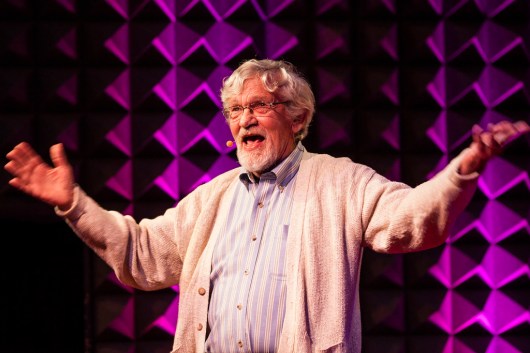Daniel Ogilvie was shocked when his 4-year-old daughter ran out of her bedroom screaming, “I don’t want to be a thing that dies.” But every child goes through this moment of recognizing their mortality. A Rutgers University professor who has studied philosophy for the past 25 years, Ogilvie has become fascinated with our beliefs about death and afterlife. In a thought-provoking talk at TED@New York — one of the 293 talks given as part of the 2013 Talent Search — Ogilvie explains his impetus for teaching a course about “soul beliefs,” whether or not we think something of ourselves carries on after our physical body dies.
What is your drive to separate religion from the beliefs of the afterlife? Why do you feel that is important to do in your research and work?
Truth is, I don’t make the separation between religion and afterlife beliefs. Religions make use of afterlife beliefs. Now, each religion has a different message about what to do, and how you have to behave and who to believe in, in order to make it into this gated community called heaven. But each religion has a view on that — a message and the point that I make is that each religion has different prescriptions.
Now, I’m ambivalent again, but that’s what got me into this issue. I mean, what we’re concerned about now is competition between religions about how to get to heaven, and there have been lots of wars fought over this — well, part of the motivation for wars fought is this, and each of the warring tribes are about to have access to nuclear weapons — we’re going to blow ourselves up. I started reading about this, writing about it and doing research on it, but if I cut this out, I will end up with something about how my goal is to have people talk about their beliefs about the soul, about afterlife, and to question the assumptions that we have without really thinking about them. [These thoughts] have been ingrained in us, but my point is to bring them from a level of absolute certainty to “I’m not sure,” and that’s where I make my break. If we’re operating with “I’m not sure,” that may reduce the kind of tension that exists in the world.
Are you particularly a religious man yourself?
No. I give a whole course on this, and at the end of the course [students] still don’t know if I’m an atheist or something like that, and I’m fine with that. I just want them to think about their own beliefs, talk about it, argue about them — well not necessarily argue about them, but read about the history.
I’ve written this long thing about the history of afterlife beliefs, and I’ve written another thing on how we come to believe anything — it’s called, “Anatomy of Internalized Beliefs.” So I keep on, you know, pushing this thing, but I should probably be either retired or dead.
Actually I was to retire next year, but the university loves this course, so it’s the last year I’m teaching it. I co-teach it with somebody who’s really retiring. But, they’re going to videotape it in the fall with really good, professional videotaping to make it available. Maybe for free courses or maybe they’d sell it to universities, with Rutgers making the profit, as a hybrid course where you’d go through the lectures, have recitation, and I would work up a manual on what to do. The university said instead of retiring, let’s put you on a research professor line, so that’s what we’re working on now. It’s a very engaging topic that people are very interested in talking about, and before now this was sacred territory.
Watch out for more Q&As from the TED@NY event throughout this week. Head to TalentSearch.TED.com to watch and rate these talks, as well as those from the 13 other stops along the TED2013 Talent Search tour.

Comments (2)
Pingback: Soul Talk: My Experience Researching & Teaching on Souls at Rutgers University | Applied Sentience